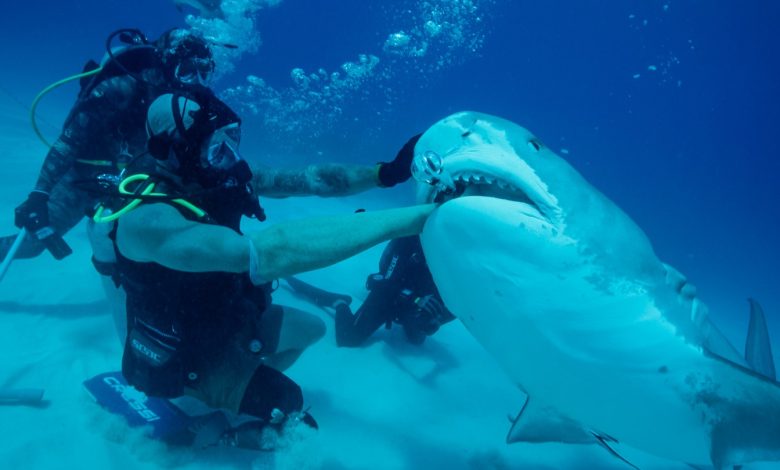The Enduring Popularity of ‘Shark Week,’ Discovery’s Secret Ratings Weapon

It’s mid-summer, the heat is on across the country and — as they’ve been doing for more than 30 years — many of the nation’s TVs are tuned in to… educational programming?
That’s right, it’s Shark Week on Discovery Channel, the massive, annual television event that this year offers 20 new original programs featuring the underwater apex predator.
Now that it’s arguably bigger than ever, one has to ask how Shark Week has endured the storm of cord-cutting and ongoing streaming wars to become a ratings juggernaut and the longest-running cable television event in history?
More than a decade after the release of Steven Spielberg’s Jaws (and a year after Jaws: The Revenge), the original blockbuster that kept audiences out of the water, terrified of what lurked near the shore of ocean beaches, Discovery launched an earnest attempt to promote shark education and conservation, as “[Insert Topic Here] Week” content blocks and events were all the rage on television. The first Shark Week consisted of 10 episodes of shows, including Caged in Fear, Sharks: Predators or Prey, The Shark Takes a Siesta and Sharks of a Different Color.
Today, the stakes are higher and the budget has soared, amid dramatic reenactments, celebrity-hosted specials and pulse-pounding footage. This has led to a drift, the annual TV event’s critics say, arguing that the small-screen spectacle has moved too far from its roots in science education. As Shark Week continues to command attention and Discovery looks to top the 25 million viewers who tuned in last summer, the question is now whether the line between education and entertainment has disappeared into the water.
While the event has its detractors, its purveyors are happier than ever with the fruit of their efforts.
“Shark Week continues to evolve as a cultural phenomenon, blending adrenaline-fueled storytelling with cutting-edge science,” Howard Lee, chief creative officer of U.S. Networks and president of Discovery Network, told reporters, including The Hollywood Reporter, ahead of Sunday’s debut. (Shark Week runs July 20 – 26.) “But what truly sets it apart is the sheer joy and wonder our teams feel in bringing it to life. Every year, we dive into uncharted waters — discovering new stories, pushing creative limits and celebrating the awe-inspiring world of sharks with fresh eyes. This time, the sharks aren’t just circling — they’re dancing.”
Lee references what may be Shark Week’s biggest spectacle yet: a Tom Bergeron-hosted deep-sea dance-off called Dancing With Sharks, where five divers — all trained by a world-class underwater choreographers — dance down their shark partners and are judged, reality competition-style. The entertainment value is high, while the educational value here isn’t quite the draw.
The event has also been derided by some critics over the years (Wil Wheaton’s 2013 accusations and the boycott following the airing of a mockumentary about the extinct Megalodon, which was presented as factual, come to mind), as is using cheap tactics to become a purveyor of junk science and using wild theories over data points. An adoption of a fictitious docudrama style, where scenarios are created for the show’s cast, brought in more subpar episodes which many feel didn’t help the cause. It also didn’t help when Olympian Michael Phelps’ televised race against a great white wa later discovered to be computer-generated.
Kendyl Berna, a documentary producer, marine biologist and co-founder of Beyond the Reef, who appears on the thrilling Black Mako of the Abyss, one of this year’s major new shows, spoke about this last week in an interview with THR.
“Even though it is entertainment — and a lot of times, there’s probably certain scientists and academics who are looking at it like, ‘That’s a weird way to approach shark science’ — we’re doing this for the greater good of getting some science out of it, while also just showing people how awesome sharks are and why they need to be protected,” she said.
Elsewhere in this year’s Shark Week, the ideal balance of education and entertainment value is struck. In How to Survive a Shark Attack, affable host Paul de Gelder, who lost an arm and a leg, literally, when he survived an underwater encounter with an ocean terror, makes the bold decision to re-create that attack with live sharks and share with audiences the tactic to save themselves if such a nightmare scenario occurred in their lives. It’s a fun, scary and smart hour of television that sticks to the ethos of the event: expanding knowledge while riveting viewers by getting them up close with some real-life jaws and fake gore.
“It’s fascination of this animal that’s almost like a unicorn,” De Gelder told THR when asked about Shark Week‘s enduring popularity. “It exists, we think, but we’ve never actually seen one. These animals are literal dinosaurs… and yet they’re still here in so many different species, in so many different environments. We’ve been trained to think they’re super dangerous, mindless killers. Yet we’re in the water diving with them and we’re not getting killed. It breaks down that misconception that these animals should be killed, that they should be fished and wiped out — which they absolutely shouldn’t.”
Over the years, Discovery’s initial attempt to get shark content into homes across America exploded. Its first hosted show came in 1994 with Jaws author Peter Benchley, drawing a record 30.8 million unique viewers. In 2000, personalities from other Discovery series were added as hosts; in 2015, the network launched a “Shweekend” event with new programming; and in 2023, Discovery shot to No. 1 in primetime across key demos. In 2024, Shark Week benefited from Discovery’s front-and-center position in the streaming wars as it reached 25 million total viewers across linear and streaming platforms. This was up 10 percent from 2023.
So, what’s the secret to creating a multiplatform cultural moment like Shark Week? It consisted of establishing momentum around nostalgia viewing, creating a Herculean social media presence and developing cross-brand partnerships. With social teams live-tweeting each night — with exciting live shark cams, branded tie‑ins, merchandise and viewing parties (see Discovery’s “FinFest”) — Shark Week’s big event television status remains cemented. According to Digiday, this brought in 37 percent more new-to-Discovery viewers during Shark Week.
With its 20 new shows for 2025, there’s a chance this year’s Shark Week event could outperform its recent high-water mark. Even if it doesn’t, the sharks of this July week aren’t going anywhere, except perhaps to a dance practice for next year’s event, or to charge at Discovery’s latest daredevil host.
Source: Hollywoodreporter
HiCelebNews online magazine publishes interesting content every day in the TV section of the entertainment category. Follow us to read the latest news.
Related Posts
- The Atlantic Festival Adds ‘The Diplomat’ Season 3 First Look and Panels With Tom Hanks, Sterlin Harjo (Exclusive)
- ‘The Fantastic Four: First Steps’: First Reactions From the Premiere
- BBC Studios Names Amanda Jones Chief Financial Officer
- Donald Trump Won’t Absolutely Love That He Just May Have Handed Stephen Colbert an Emmy
- Malcolm-Jamal Warner Remembered by Tracee Ellis Ross, Magic Johnson, More: “You Made the World a Brighter Place”





